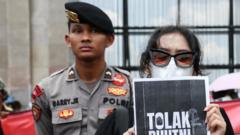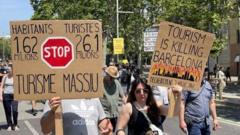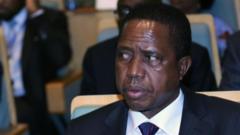Indonesia's recent legislative changes have ignited major protests, as the military is granted increased power to engage in civilian roles without resigning from active duty. Critics argue this could threaten the foundations of democracy established after the Suharto regime. Activists have voiced fears that President Prabowo Subianto, closely linked to Suharto, is consolidating power and undermining civil liberties and human rights, with significant implications for Indonesia's political future.
### Indonesia's Military Law Changes Spark Public Outrage

### Indonesia's Military Law Changes Spark Public Outrage
Indonesia's parliament has approved new legislation increasing military influence in governance, raising concerns over a potential return to authoritarianism.
In Jakarta, demonstrators are standing strong against the Indonesian parliament's recent legislative overhaul allowing greater military engagement in civilian governance. The revisions, supported by President Prabowo Subianto, formerly a military officer, allow active personnel to occupy government positions without resigning. This move has raised alarms about a return to the oppressive Suharto dictatorship, leading to on-going protests from thousands of activists and citizens.
Critics emphasize that military involvement in politics undermines democracy and civil oversight. "The heart of democracy is that the military should not engage in politics," states Wilson, an activist from KontraS. Previously, over 2,600 active-duty officers were already in civilian roles, highlighting a trend that may escalate with these new changes. The revision permits military personnel to serve in additional civilian institutions and extends the retirement age for high-ranking officers, consolidating military power further.
Dedi Dinarto, an analyst, warns that this legislative shift represents a deeper consolidation of power favoring stability and control over democratic principles. While the defense minister argued that global military shifts necessitate these amendments, the law's passage has raised crucial questions about accountability and the impartiality of judicial roles populated by active-duty military personnel.
Human rights organizations have raised concerns that President Prabowo, through these laws, may be on a path to restoring a militaristic governance style reminiscent of past abuses under the Suharto regime. Activists have vowed to maintain protests against the legislation, asserting their commitment to defending democracy. "We will resist," said Sukma Ayu, a student activist. The tensions between the Indonesian government and its citizens are far from resolved as calls for democracy continue amidst government upheaval.
Critics emphasize that military involvement in politics undermines democracy and civil oversight. "The heart of democracy is that the military should not engage in politics," states Wilson, an activist from KontraS. Previously, over 2,600 active-duty officers were already in civilian roles, highlighting a trend that may escalate with these new changes. The revision permits military personnel to serve in additional civilian institutions and extends the retirement age for high-ranking officers, consolidating military power further.
Dedi Dinarto, an analyst, warns that this legislative shift represents a deeper consolidation of power favoring stability and control over democratic principles. While the defense minister argued that global military shifts necessitate these amendments, the law's passage has raised crucial questions about accountability and the impartiality of judicial roles populated by active-duty military personnel.
Human rights organizations have raised concerns that President Prabowo, through these laws, may be on a path to restoring a militaristic governance style reminiscent of past abuses under the Suharto regime. Activists have vowed to maintain protests against the legislation, asserting their commitment to defending democracy. "We will resist," said Sukma Ayu, a student activist. The tensions between the Indonesian government and its citizens are far from resolved as calls for democracy continue amidst government upheaval.






















